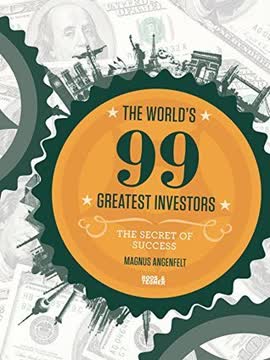Key Takeaways
1. The Paradox of Success: Diverse Paths, Shared Principles
‘The fascinating thing about investments is that there are so many different ways to succeed.’
Unconventional wisdom. The world's greatest investors defy a single, universal formula for success. Some never meet management, others prioritize it; some buy highs, others lows; some are local, others global. This vast array of strategies, from concentrated portfolios to thousands of positions, and from short-term trading to decades-long holding, highlights that there's no one-size-fits-all approach.
Common threads. Despite their wildly different methods, these investors share fundamental principles. They stick firmly to their chosen principles in the short term, but are pragmatic enough to adapt in the long term. This blend of conviction and flexibility is crucial for navigating ever-changing market conditions.
Beyond strategy. The true "secret" isn't a specific stock-picking method, but rather a deep understanding of oneself and the market's inherent nature. It's about recognizing that while strategies vary, underlying virtues like discipline, hard work, and emotional control are universally applicable.
2. Master Risk, Not Just Returns
Low risk-taking and careful risk management are common to almost all the investors here.
Counter-intuitive success. It might seem logical that the highest returns come from taking the greatest risks, but the opposite is true for the world's top investors. Their success stems from a profound focus on capital preservation and meticulous risk management, rather than reckless gambles.
Prioritizing survival. These investors prioritize avoiding catastrophic losses over chasing maximum gains. They understand that "you cannot eat relative performance" and that a significant loss can be incredibly difficult to recover from. This cautious approach ensures longevity in a volatile market.
Healthy fear. Many successful investors exhibit a constant awareness of potential problems and are perpetually worried, fostering a humble attitude towards their work. This "healthy fear" drives critical thinking and prevents complacency, allowing them to navigate uncertainty with greater resilience.
3. Adapt or Perish: The Imperative of Flexibility
Clinging grimly to a favoured strategy is quite simply not a proven route to success.
Evolutionary investing. The market is a dynamic entity, and successful investors recognize that what worked yesterday may not work tomorrow. They are pragmatism incarnate, willing to discard obsolete strategies and embrace new approaches when market conditions change.
Examples of adaptation:
- Warren Buffett: Evolved from pure value investing to include quality companies, and even invested in technology (IBM) late in his career.
- Francisco García Paramés: Shifted from deep value to high-quality companies, even when substantial discounts were available elsewhere.
- Sir John Templeton: Began short selling at 88 during the dot-com bubble, demonstrating remarkable openness to new thinking.
Survival of the adaptable. This flexibility is akin to the theory of evolution: it's not the strongest or most intelligent that survive, but those most adaptable to change. The ability to alter one's compass bearing in response to market shifts is a hallmark of enduring success.
4. Value Investing Reigns, But with a Modern Twist
Over time, this strategy has proved to offer the most enduring, highest long-term returns.
The bedrock strategy. Value investing, pioneered by Benjamin Graham, is the most prevalent strategy among the 99 greatest investors. It involves buying assets at a significant discount to their intrinsic value, often described as "paying 50 cents for a dollar."
Evolution and nuance. While Graham's original approach was quantitative and focused on balance sheets, modern value investors, like Warren Buffett, have incorporated qualitative factors such as management quality and competitive advantages. This evolution has allowed the strategy to remain relevant despite periods of underperformance, such as the dot-com bubble.
Beyond the numbers. The core idea remains: invest in a business, not just a piece of paper, and understand its true worth. This long-term perspective, coupled with a margin of safety, has consistently delivered superior returns, even if it means waiting patiently for the market to recognize true value.
5. The Power of Patience and Independent Thought
Patience is a virtue, in investing as in all else.
The long game. Successful investing is not a sprint but a marathon, demanding immense patience. Investors must be willing to wait for the right opportunities, sometimes holding significant cash reserves, and then endure long periods before their divergent views are proven correct.
Swimming against the current. Independent thinking is paramount, often requiring investors to be contrarians—buying what no one else wants. This is emotionally difficult, as it means going against the crowd and potentially "looking wrong" for extended periods.
Conviction and resilience. The ability to ignore market noise and stick to one's well-researched convictions, even when ridiculed, is a defining trait. This mental fortitude allows them to capitalize on market inefficiencies driven by collective fear or euphoria.
6. Know Thyself: Your Rhythm, Strengths, and Biases
It is far more important to embrace this general advice than to attempt to copy a successful investor’s strategy to the letter.
Self-awareness is key. Understanding one's own investment rhythm, strengths, and weaknesses is more critical than blindly copying a guru's strategy. Successful investors identify their particular aptitudes and stick to them, avoiding unknown territory.
Emotional discipline. The greatest enemies in investing are emotions like fear and greed. Top investors separate facts and analyses from expectations and hopes, maintaining self-control and discipline to prevent impulsive decisions.
Learning from mistakes. Mistakes are inevitable, but the true measure of an investor is their willingness to learn from them. This continuous learning process, coupled with a good memory for past errors, is vital for long-term improvement.
7. The Unsung Heroes: Why Investors Matter to Society
The more intelligently money is managed, the better the world’s wheels spin.
Beyond personal gain. While often depicted as self-serving, successful investors play a crucial role in society. They efficiently funnel capital to entrepreneurs, companies, and countries, ensuring that viable ventures receive necessary financing and weak businesses are not overly supported.
Economic engine. By seeking the best returns, these investors allocate risk capital in the most efficient manner possible, leading to higher living standards and reduced poverty. Their performance encourages more capital to enter the financial market, increasing competition and improving the overall economy.
Philanthropic impact. Many of the wealthiest investors in the book are active philanthropists, dedicating significant portions of their fortunes to charitable causes. This demonstrates a broader altruistic view, challenging the stereotype of the "scrooge."
8. The Market's Flaws: Opportunity for the Diligent
The market is really not that efficient, after all.
Challenging EMH. The consistent outperformance of these 99 investors, often by significant margins over decades, strongly refutes the Efficient Market Hypothesis (EMH). If markets were truly efficient, such sustained superior returns would be impossible.
Exploiting irrationality. Market inefficiencies arise because markets are ultimately composed of individuals swayed by emotions and herd behavior, leading to prices driven above or below justified values. Diligent investors exploit these mispricings through thorough, independent research.
The power of homework. Deep, original research—often involving talking to customers, competitors, and middle management, rather than relying on Wall Street reports—is a common thread. This commitment to understanding the underlying business provides a crucial informational edge.
9. The Human Element: Temperament Trumps IQ
success doesn’t correlate with IQ beyond a level of 125 – everything above that is of little use.
Temperament over intellect. While a high level of education is common, raw IQ beyond a certain point does not guarantee investment success. Instead, qualities like temperament, discipline, and emotional control are far more critical.
Discipline and hard work. The path to success is paved with arduous work, perseverance, and dedication. There are no shortcuts; even brilliant minds must put in the hours to develop the necessary skills and insights.
Embracing failure. Early career failures and debacles are virtually the rule, not the exception. The ability to learn from these mistakes, rather than being deterred by them, is a defining characteristic of those who ultimately achieve lasting success.
10. The Long Game: Experience, Mentorship, and Longevity
On average, most of them have had 15 years of dry runs before setting up shop themselves.
The apprenticeship model. Few investors become stars overnight. The majority spent years, often a decade or more, in "dry runs" or under the supervision of older mentors, honing their craft before managing significant capital independently.
Early beginnings. Many of the most successful investors started cultivating their interest in finance at a very young age, some even as children. This early exposure and passion allowed them to accumulate invaluable experience over a lifetime.
Work promotes longevity. Investing appears to be an ideal activity for promoting longevity and mental alertness. Many fund managers remain active well into their seventies and eighties, demonstrating a tireless enthusiasm and curiosity for their work that transcends age.
Last updated:
Review Summary
The World's 99 Greatest Investors receives mixed reviews. Some praise its diverse selection of successful investors and valuable insights, while others criticize its brevity and occasional inaccuracies. Readers appreciate the global perspective and variety of investment strategies presented. However, some find the book lacks depth and detail, particularly for novice investors. The book's structure and easy readability are commended, but concerns are raised about its editing and sourcing. Overall, it's seen as a good starting point for further research on successful investors.
Similar Books










Download PDF
Download EPUB
.epub digital book format is ideal for reading ebooks on phones, tablets, and e-readers.




